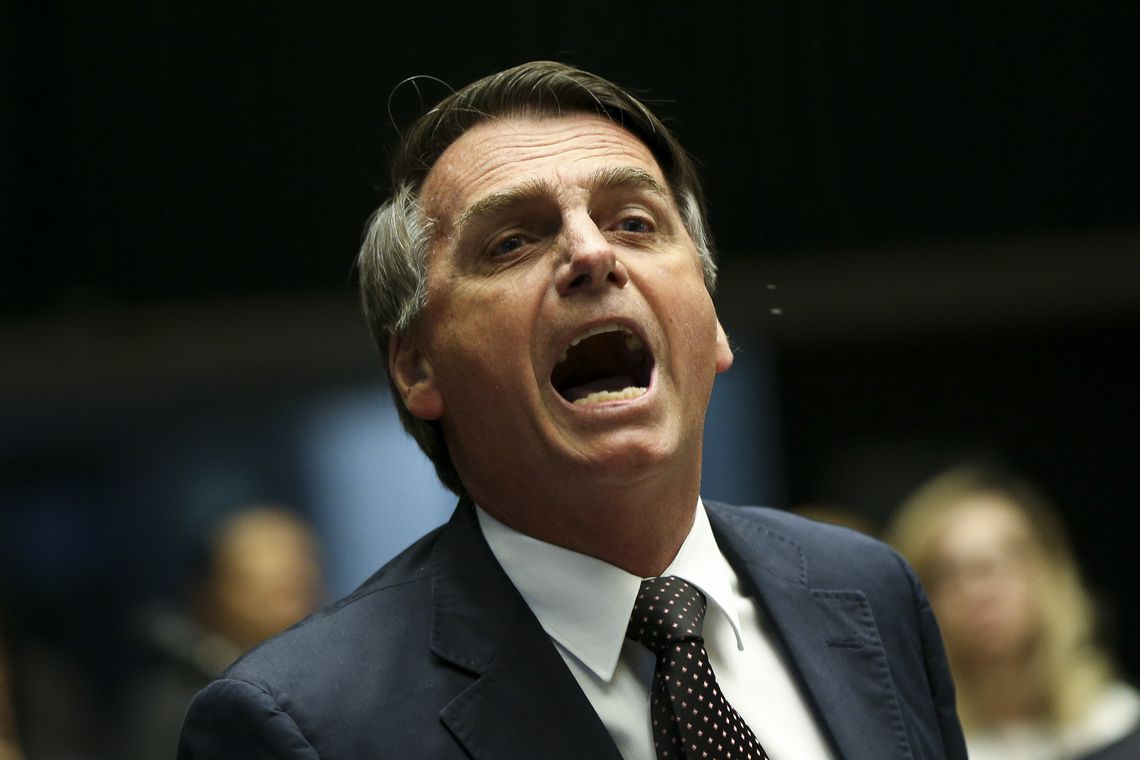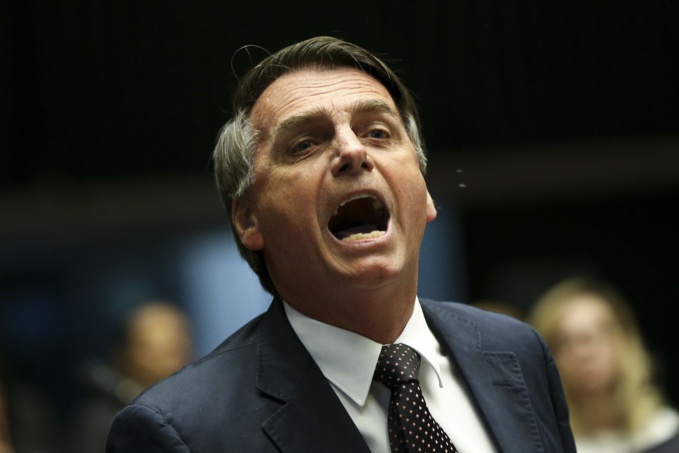Jair Bolsonaro’s victory in the elections was celebrated by his supporters until late at night on October 28. Fireworks rattled all over the country, and President himself, after the announcement of the election results, came out to the voters three times with words of gratitude and an appeal to “strive for reconciliation” and unite.
It was difficult to believe in such an outcome of events on the eve of the second round of the presidential elections in Brazil, despite the fact that forecast promised victory to Jair Bolsonaro.
Opponents of the politician also painted a picture of an awesome future for Brazilians in the event of the victory of the right-wing candidate. “We reached the final of the race with a threat to the country, democracy and the people who suffer the most,” wrote the founder of the Workers Party, Luiz Inácio Lula da Silva, who initially was to become a rival to Bolsonaro. He called the arrival of the rightist politician to power the "fascist threat."
The petition “against fascism in Brazil” on the site Change.org was signed by more than 33 thousand people. Among them are the former presidents of France and Argentina, Francois Hollande and Christine Kirchner, US Senator Bernie Sanders, human rights activist Angela Davis, publicist and philosopher Noam Chomsky.
A few days before the second round of elections, the Brazilian federal prosecutor’s office launched two inquiries against Bolsonaro’s economic adviser Paulo Guedes. He is suspected of fraud in managing funds of state-owned companies and risky financial transactions.
However, neither warnings of politicians, public figures and the media, nor criminal cases against Bolsonaro’s wing man dissuaded supporters of the right-wing candidate to vote for him. He won the election with a score of 55% and left behind a candidate from the Workers Party, Fernando Haddad, who gained 44.8%. The 63-year-old politician who dreamed of being a president from childhood, has finally achieved his goal.
Bolsonaro’s campaign promises largely echo the initiatives that he launched during his term as an MP. However, in addition to the theses on the free carrying of weapons, the death penalty and criminal liability, he has other proposals.
For example, he plans to toughen penalties for corruption, provide the police with a legal basis for freer use of force, open new military schools in major cities, promises to prevent adoption of children by same-sex couples, liberalizing drug legislation, legalizing abortions and at the same time reducing level of violence against women.
Large-scale plans for internal political reforms: to exclude the possibility of re-election of President and other representatives of the executive branch, to increase the presidential term from four to five years, to reduce the number of parliamentarians from 513 to 400, to halve the number of ministries.
At the same time, in the case of these reforms, Bolsonaro promises that he will remain President for four years, and will not be re-elected for a second term.
In the economic sphere, President proposes to reduce the tax burden for all people, and it is possible that citizens with low and middle incomes can be completely exempted from taxes. He also plans to launch a privatization program for most of the Brazilian state-owned companies, and at the same time not allow them to fall into the hands of Chinese businessmen. The politician is critical of China, since representatives of this country, in the opinion of the President-elect, do not just do business in Brazil, but “buy up the country”. Between 2010 and 2016, mainly during the reign of Dilma Rousseff, Chinese investment in Brazil grew by 37%. Beijing became the country's main trading partner, beating even the United States.
Bolsonaro is set to correct this situation. He promises to give preference to bilateral agreements, to stop "praising dictatorships" and "attacks on democracy", such as, for example, the United States and Israel. He also promised that, following the example of the United States, he would transfer the Brazilian embassy in Israel from Tel Aviv to Jerusalem. At the same time, he does not recognize Palestine as a country, although he “has nothing against the Palestinian people.” He also notes that he wants to get closer to Europe and Japan and stop "flirting" with the leftist regimes.
Despite his sympathy for Trump, the Brazilian leader promised not to follow him in everything: for example, he assured that he did not plan to leave the Paris Climate Agreement.
All in all, Bolsonaro was elected not for his foreign policy guidelines. If you combine the data of opinion polls, the typical voter for Bolsonaro is a white religious man with middle and high income. In many respects, voters were attracted by his promises to make weapons free and deal with the criminals. In 2017, 63880 people were killed in the country: 7 people per hour, 175 per day. It influenced his popularity and the disillusionment of a number of Brazilians in the ruling Labor Party for a long time, since the presidents from this party, Dilma Rousseff and Luiz Inacio Lula da Silva, became defendants in corruption scandals.
source: reuters.com, cnn.com
It was difficult to believe in such an outcome of events on the eve of the second round of the presidential elections in Brazil, despite the fact that forecast promised victory to Jair Bolsonaro.
Opponents of the politician also painted a picture of an awesome future for Brazilians in the event of the victory of the right-wing candidate. “We reached the final of the race with a threat to the country, democracy and the people who suffer the most,” wrote the founder of the Workers Party, Luiz Inácio Lula da Silva, who initially was to become a rival to Bolsonaro. He called the arrival of the rightist politician to power the "fascist threat."
The petition “against fascism in Brazil” on the site Change.org was signed by more than 33 thousand people. Among them are the former presidents of France and Argentina, Francois Hollande and Christine Kirchner, US Senator Bernie Sanders, human rights activist Angela Davis, publicist and philosopher Noam Chomsky.
A few days before the second round of elections, the Brazilian federal prosecutor’s office launched two inquiries against Bolsonaro’s economic adviser Paulo Guedes. He is suspected of fraud in managing funds of state-owned companies and risky financial transactions.
However, neither warnings of politicians, public figures and the media, nor criminal cases against Bolsonaro’s wing man dissuaded supporters of the right-wing candidate to vote for him. He won the election with a score of 55% and left behind a candidate from the Workers Party, Fernando Haddad, who gained 44.8%. The 63-year-old politician who dreamed of being a president from childhood, has finally achieved his goal.
Bolsonaro’s campaign promises largely echo the initiatives that he launched during his term as an MP. However, in addition to the theses on the free carrying of weapons, the death penalty and criminal liability, he has other proposals.
For example, he plans to toughen penalties for corruption, provide the police with a legal basis for freer use of force, open new military schools in major cities, promises to prevent adoption of children by same-sex couples, liberalizing drug legislation, legalizing abortions and at the same time reducing level of violence against women.
Large-scale plans for internal political reforms: to exclude the possibility of re-election of President and other representatives of the executive branch, to increase the presidential term from four to five years, to reduce the number of parliamentarians from 513 to 400, to halve the number of ministries.
At the same time, in the case of these reforms, Bolsonaro promises that he will remain President for four years, and will not be re-elected for a second term.
In the economic sphere, President proposes to reduce the tax burden for all people, and it is possible that citizens with low and middle incomes can be completely exempted from taxes. He also plans to launch a privatization program for most of the Brazilian state-owned companies, and at the same time not allow them to fall into the hands of Chinese businessmen. The politician is critical of China, since representatives of this country, in the opinion of the President-elect, do not just do business in Brazil, but “buy up the country”. Between 2010 and 2016, mainly during the reign of Dilma Rousseff, Chinese investment in Brazil grew by 37%. Beijing became the country's main trading partner, beating even the United States.
Bolsonaro is set to correct this situation. He promises to give preference to bilateral agreements, to stop "praising dictatorships" and "attacks on democracy", such as, for example, the United States and Israel. He also promised that, following the example of the United States, he would transfer the Brazilian embassy in Israel from Tel Aviv to Jerusalem. At the same time, he does not recognize Palestine as a country, although he “has nothing against the Palestinian people.” He also notes that he wants to get closer to Europe and Japan and stop "flirting" with the leftist regimes.
Despite his sympathy for Trump, the Brazilian leader promised not to follow him in everything: for example, he assured that he did not plan to leave the Paris Climate Agreement.
All in all, Bolsonaro was elected not for his foreign policy guidelines. If you combine the data of opinion polls, the typical voter for Bolsonaro is a white religious man with middle and high income. In many respects, voters were attracted by his promises to make weapons free and deal with the criminals. In 2017, 63880 people were killed in the country: 7 people per hour, 175 per day. It influenced his popularity and the disillusionment of a number of Brazilians in the ruling Labor Party for a long time, since the presidents from this party, Dilma Rousseff and Luiz Inacio Lula da Silva, became defendants in corruption scandals.
source: reuters.com, cnn.com



















